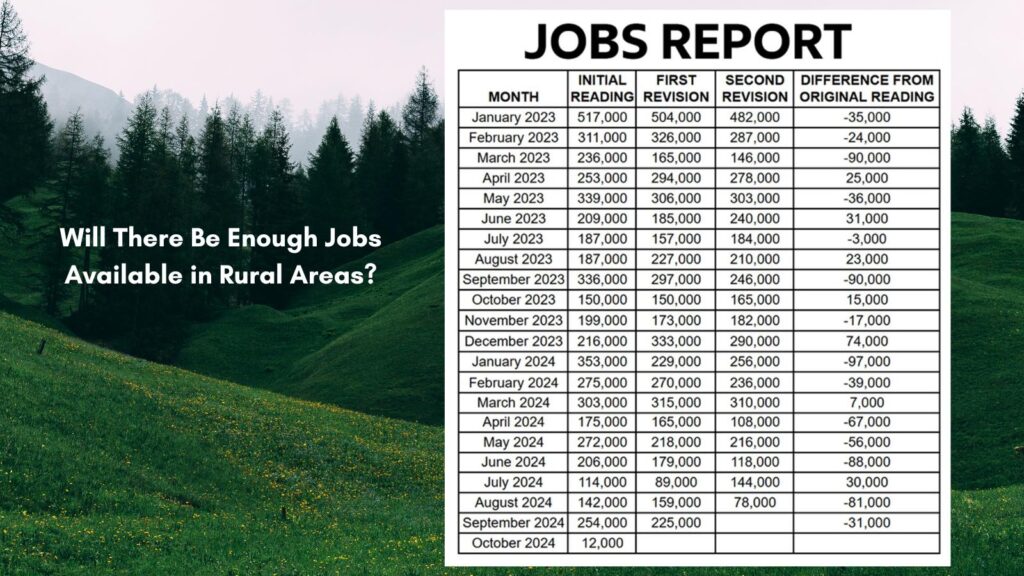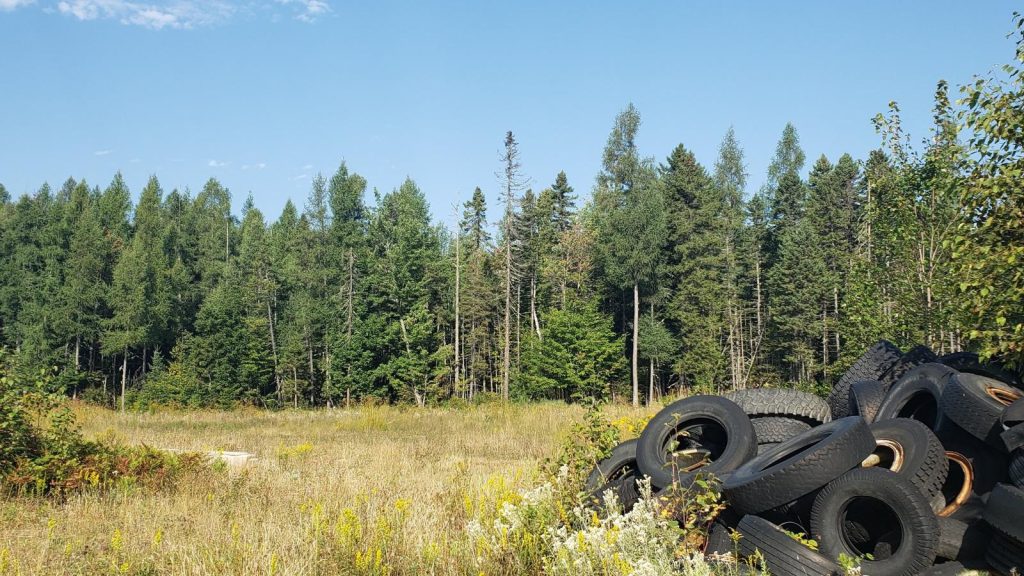The latest jobs report showed only 12,000 jobs were added to the economy. As many jobs disappear what will happen to jobs available in rural areas?
Are there enough government or social assistance jobs to sustain a rural area? According to the latest data and charts, those are the areas of job improvement today.
Ever wonder how the job market in rural areas is changing? In 2024, it’s more significant than ever. The availability of jobs in these regions isn’t just a local concern; it’s a national one. Agriculture, local businesses, and remote work potential all influence this landscape.
Rural areas have unique job challenges: limited industry variety and longer distances to drive to work.
Current Landscape of Jobs in Rural Areas
If you’re living in a rural area or contemplating the move, understanding the job market is crucial. This year showcases several important trends that can affect your career choices into 2025.
The jobs available in rural areas have evolved with technology and economic shifts, offering both challenges and opportunities. Let’s explore the current landscape with key statistics and sector-specific insights that define rural employment today.
Statistics From the November 2024 Jobs Report
- Job Growth: The national nonfarm payrolls only increased by 12,000 in October, which might reflect a cautious or slower growth in employment, potentially affecting rural areas similarly or more profoundly due to their economic structure.
- Wages and Earnings: Average hourly earnings increased by 0.4% month-over-month, which could mean that wages in rural areas are also seeing a little growth, although this might not be uniform across all sectors or locations.
- Challenges: Despite these figures, rural areas face unique challenges such as less diverse job markets, reliance on sectors like agriculture, forestry, or mining which are volatile, and longer commutes to employment centers which might not be fully captured in general employment statistics.
Sector-Specific Job Trends
Understanding available employment opportunities to individuals living in rural areas can guide your job search.
- Agriculture: This sector remains the backbone of rural employment, employing a large workforce segment. Advances in agricultural technology are creating roles that require tech-savvy individuals, such as farm management software specialists. However many areas of the country have many notably wind and solar. This trend is opening up jobs in project management, engineering, and environmental compliance.

By examining these statistics and sector-specific trends, you can gain insights into the evolving nature of jobs available in rural areas. This awareness can help you navigate the job market more effectively, aligning your hope with promising opportunities.
It is also an indicator for those looking to retire or those already retired. If you need healthcare, will there be enough nurses or doctors in your area to help?
Factors Influencing Job Availability in Rural Areas
Economic Changes and Their Impact
Economic changes can shake things up in a big way. Imagine globalization as a double-edged sword.
On the one hand, it’s opened up rural areas to broader markets, but on the other, it has introduced fierce competition, often hitting small, local businesses hard. Technological advancements are similarly mixed blessings.
Automation, for instance, enhances productivity but sometimes reduces the need for traditional labor. Ask yourself, “How can rural areas adapt to these shifts”? It might involve embracing new technologies while finding unique niches where large corporations can’t compete.
Demographic Changes on Jobs Available in Rural Areas
Rural demographics can tell a compelling story. As populations age, a growing demand for healthcare services opens up job opportunities in those areas. However, many young people leave for bigger cities, seeking education and other career paths.
This migration affects job availability, sometimes leading to labor shortages. You might wonder, what keeps people from moving away? It could be the high cost of living in rural areas as the taxes increase as people move away.
Where we will in a rural area of Maine there are never enough truck drivers with CDL licenses to help with road work. My husband owns a dump truck and works with others who are in the 70’s.
The younger generation is not interested in driving trucks for a living. Most younger people (and their parents) believe they must go to college to land a good job.
They come out with high debt that they can’t get out of 4 or 6 years later. However, there is a need in the trades that young people today can learn with more trade jobs available in rural areas.
Government Policies and Initiatives Affecting Jobs Available in Rural Areas
Governments can play a pivotal role in job creation through strategic policies. Programs that aim to boost local industries, improve infrastructure, and offer tax incentives can attract businesses to rural areas. Some initiatives focused on enhancing digital connectivity, are essential for remote work and attracting tech firms.
Think about the possibility: how might these tax policies transform your community? It could mean more job openings locally, reducing the need for long commutes or relocation.
Understanding these policies when you go to vote is of utmost importance as your vote can make a difference in the jobs available in rural areas.
It can also affect those retired in the area as they may see their taxes increase. In Maine, they eliminated freezing seniors’ property taxes in 2023 while others enjoy tax relief in other states. I keep telling others it could happen in their state next, so be aware.
Remote Work Trends
The rise in remote work has blurred the lines of traditional employment locations and gives you the ability to access jobs well beyond your immediate surroundings. As technology bridges the gap, you no longer need to leave your community to find fulfilling work.
This flexibility can impact rural employment, providing opportunities in sectors like IT, marketing, and customer service without relocating.
Consider how you can benefit from this trend: ensuring reliable internet access and developing digital skills employers value. Tools like Slack and Zoom are standard in the remote workplace—familiarity with these can put you ahead.
Entrepreneurship and Local Business Growth Affect Jobs Available in Rural Areas
Encouraging local entrepreneurship is a great way to create jobs and get the local economy buzzing. When you start your own business or support local startups, you invest in the community’s future. Whether opening a farm-to-table restaurant or starting a service-based business, the potential may be huge.
By focusing on these areas, you can better prepare for shifts in job availability in rural areas.
A Glimpse Into the Future of Rural Jobs
As you ponder the future job landscape in rural areas, remember that understanding job trends is not just informative—it’s a strategic move. You’ve seen how technology and changing demographics shape the job market.
Now, it’s time to consider how you can prepare for what’s next. While there are huge challenges, there’s also some potential for growth and innovation.
Embracing Remote Work Opportunities
The rise of remote work is a game-changer for rural communities. You can now access roles that might have been out of reach long ago. With a computer and internet access, the world becomes your office.
Remote work isn’t just a trend—it’s a new way of living and working. By embracing remote opportunities, you can diversify your income sources and bring new skills back to your community.
However, note that 90% of big corporations are calling people back into the office as we near 2025. That trend of working from home may change and impact the jobs available in rural areas.
The Role of Continuous Education and Skill Building
Staying competitive in today’s job market is all about continuous learning. Whether you sign up for a local workshop or an online course, the skills you gain now could be your ticket to future job security.
Community colleges offer invaluable resources, often with programs tailored to in-demand industries. Don’t underestimate the power of self-directed learning and internships.
Online platforms offer courses on nearly every subject imaginable. Constantly upgrading your skills keeps you agile and prepared for whatever comes next with jobs available in rural areas.
Where we live we often pass by a masonry school on our way to the big town where we shop for groceries to save money. It’s nice to see a masonry school in a rural area where younger people are getting started with their careers.
Supporting Local Innovation and Entrepreneurship
When you support local businesses or consider starting your own, you contribute to the economic growth of your community. Innovation doesn’t just come from cities; it can sprout in small towns and open fields.
However, the community needs money to pay for your products or services. When the economy loses jobs this may impact your new small business.
Conclusion: Jobs Available in Rural Areas
If you want to relocate to a rural area, stay informed about job trends in rural areas to make savvy career choices. Pay attention to the shifts in key sectors like agriculture, healthcare, and renewable energy.
When you understand these trends, you can better position yourself for the future. Jobs in rural areas are evolving just as they are in urban environments.
Are you adapting to these changes? By keeping a pulse on the job market, you’re not just reacting to change; you’re ready to pivot.
Lastly, if you are retired or thinking about retiring to a rural area, this can impact where you live. You may need services and products available close to you as you age. Will enough people be working nearby to provide that for you?




